
|
|
||||
|
|
||||
|
|
||||
|
|
MY MOVE TO AUSTRALIA After I finished national service, I went to Lerin for a short while
and then back to Neret. There was still a great deal of poverty and
very few job opportunities. Even though it was difficult leaving loved
ones behind, I decided to leave for Australia in search of a better
life as I had endured my fair share of adverse times. I organised
my own papers and with the financial help of relatives in Australia,
I made the move. I left in 1955 and it wasn't until 2011, some 56
years later, before I would see my village again. I came on the British ship Oronsay which was one of the most modern
ships of its day. It was decked out in beautiful carpets, mirrors,
and fittings. Petre Popov (another Neret resident) who went onto Melbourne
told me to make sure I choose a British ship because they're the best.
I could have come out on a religious ship for 10 pounds but decided
to go with the more luxurious ship. On Wednesday 3rd June 1955, after several weeks at sea, I arrived in Fremantle on board the British ship "Oronsay". On the following Monday, 5 days after having arrived, my sister Fania's fiancé, Petre Kitin took me to Midland, where he worked at the Railways Workshop, in the hope of finding me work. Fania was still in Neret but had agreed to marry Petre - photos were exchanged and relatives in each village (Neret and Krepeshina) vouched for each person's character. This is how quite a few of the marriages were organised in those days. Petre organised for Fania to come to Perth soon after and they were married. There was a shortage of men back in the villages as many had been killed in the Civil War or left in search of work. On the flip side, there was a shortage of Macedonian women in Australia. Photos of me on deck with other travellers on the ship Oronsay on my way to Fremantle in 1955.
Petre was unable to secure a job for me at the railways workshop
so he organised a return rail ticket so that I could get back home.
On the way back, I got confused and thought that I had reached the
city station, but I got off one stop too early - at East Perth. When
I disembarked, the conductor took my ticket before I realized that
I had gotten off at the wrong station. I now had to figure out how
to work my way back home. Soon after, another train came by. I jumped
onto it and got off at the city station which was only a short distance
away. When I tried to disembark, I was asked for my ticket. I didn't
know what to do. I was aware of what the conductor was asking for,
but I couldn't explain what had happened prior. I pulled out what
little money I had in my pocket and gestured for him to take what
he needed. The conductor obviously didn't know how many stops to charge
me for. Whilst they were trying to figure out what to do with me,
I was detained in a small office. I had been there for a while when
I noticed that the man that initially stopped me, was talking to another
person and they had moved some distance from the office that I was
in. I used the opportunity to make a run for it. When they realised
I had made a run for it, they started shouting for me to stop, but
I just kept running.
After I thought it was safe, I needed to board a train from the city
to get to the Carlisle train station. The Carlisle station is on a
different line to that of the Midland station which I had been on
previously. At that time, I was living with my Vuijko Stoian Marin
(Stan Graikos) who is my mother's brother and the Carlisle station
was nearby. I needed to obtain a ticket but had difficulty pronouncing
Carlisle. I broke up Carlisle into 3 syllables and tried pronouncing
it phonetically, Car-lis-le. The man at the city station kept saying
"no such station". I must have spent half an hour trying
to pronounce Carlisle and finally, purely by luck, I pronounced Carlisle
the way it should be, and I was given a ticket. Finally, after taking
me the greater part of the day, I was home. The following day, my first cousin Mitre Marin (Jim Graikos), took
me to where he was working in the hope of securing me a job. This
time I was in luck and on the Wednesday, exactly one week after arriving
in Australia, I started working at Cullity Timbers. I had no grasp
of the English language and I'm pretty sure they gave me the job thinking
that I was Italian. The factory had quite a few Italians working there
at the time, and they thought that I would be able to converse with
assistance from some of the other Italian workers. Jim and I were
the only Macedonians working at Cullity Timbers. We were not welcomed by the Australian workers who had a dislike
of foreigners as they were negatively perceived as taking up jobs
that could have gone to the locals and, Italians in particular, due
to their part in the Second World War. We were constantly subjected
to verbal obscenities and rude gestures. I was, on a daily basis,
having bits of timber thrown at the bench saw that I was working with.
I was worried about having an eye poked out or receiving a nasty injury.
I had had enough! One particular day, the worker who was the greatest
offender, needed to go to the toilet. The toilets were opposite from
where I was working and there were two entrances - one at either end. I raced into the toilet from the opposite side to where the worker
entered, hid behind a wall, and waited for him. I used the opportunity
to knock him out and leave him face down in the urinal trough. I calmly
returned to my work bench and continued working as if nothing had
happened. I think he worked out who hit him but couldn't pin it on
me because he wasn't 100 per cent sure. I had only just finished military
service before I came to Australia, so I was fit because I had been
put through rigorous workouts. The actual work at Cullity Timbers didn't faze me as I was used to
working hard my whole life, but the continual harassment was unbearable.
Every day I would be hounded to fight after work. An Italian employee
who worked opposite me helped diffuse things somewhat by saying that
they would have to contend with him if they didn't leave me alone
but, in the end, they didn't let up. One night after work, one of the Australian workers grabbed my hat
and went to the toilet with it. When he returned, the hat was wet.
He said that he had peed on it. I pretended that I thought it was
a joke and I had a smile on my face but inside I was fuming. The worker
pulled out a card from his pocket and flashed it at me. The card was
to inform me that he was a trained boxer, but I had no idea at the
time what he was trying to tell me. I waited till he got close to
me and before he was aware of what was happening, I laid into him
with a flurry of punches. I cut his eyebrow open and when he fell
backwards, I placed my knees into his stomach and went for his throat.
When he fell backwards, he had broken his arm. He was yelling out
"This is not allowed", as he was expecting me to box fairly
- I couldn't have cared less as this was an opportunity to lay into
him. Unknown to us at the time, there was a foreman watching from
a mezzanine floor above us and he witnessed what had happened. The following day, the injured worker tried to claim workers compensation
by saying that he had tripped over a trolly and that is how he obtained
his injuries. The foreman told the manager how the worker obtained
his injuries. The manager came to me and gestured by throwing punches.
I thought that he also wanted to fight me. In my mind I was thinking
"What the hell is going on in this place." I then realised
that he was asking me what had happened. I, as best as I could, tried
to explain that the other worker had urinated in my cap and that is
why we fought. He left and the other worker was sacked. Whilst at Cullity timbers, some of the other workers were telling
me to slow down and not work so fast. They kept telling me to have
a rest - even to go and have a short nap in the drying kilns if I
wanted to because I was showing them up as not working hard enough.
I wasn't afraid of hard work as this is what I had been used to. I
couldn't do what they asked - it just wasn't me. I also felt that
I needed to work that little bit harder to make sure I kept my job.
One day I had cut to length and stacked about 250 layers of timber
on a pallet. Most other workers would only complete about 25-30 in
a day. A senior staff member arrived and took note, writing in his
notebook, what I had done. Soon after, two senior staff members arrived
with a jack and moved my pallet close to their office and then proceeded
to dismantle the timber to check to see if I had done the work properly.
The manager came soon after and asked me how I managed to get so much
good work done. I understood basically what he was asking so I pointed
to my muscles as a laugh and shrugged my shoulders. The manager later summonsed all the other workers and had a talk
to them about their lack of productivity. When the management were
taking notes about my work, I thought I was in trouble for not doing
a good enough job when it was the other way around. When the manager was talking to the other workers about the need
to work harder, one of them got irate and punched him, knocking him
to the ground and laying him out. There were two foremen who stood
and watched the manager get beaten up. After this incident, the manager
sacked the disgruntled worker as well as the two foremen for not coming
to his aid. From that point on, I got on very well with management. I was given many different roles - quite often helping in the areas wherever someone was missing due to illness. I was getting paid well but needed to do overtime because I was paying my Vuijko Stoian four pounds for board each week and I had to pay back 250 pounds for my trip to Australia. These amounts may not seem great, but at the time, they were considerable. It took me about one year just to pay off my fare out to Australia. My aunty in Manjimup, Teta Stoina (mum's sister), and Tetin Risto Karamfilov had sent the money to my mother so I could pay for my fare. The Life Story of Tanas Kirev
|
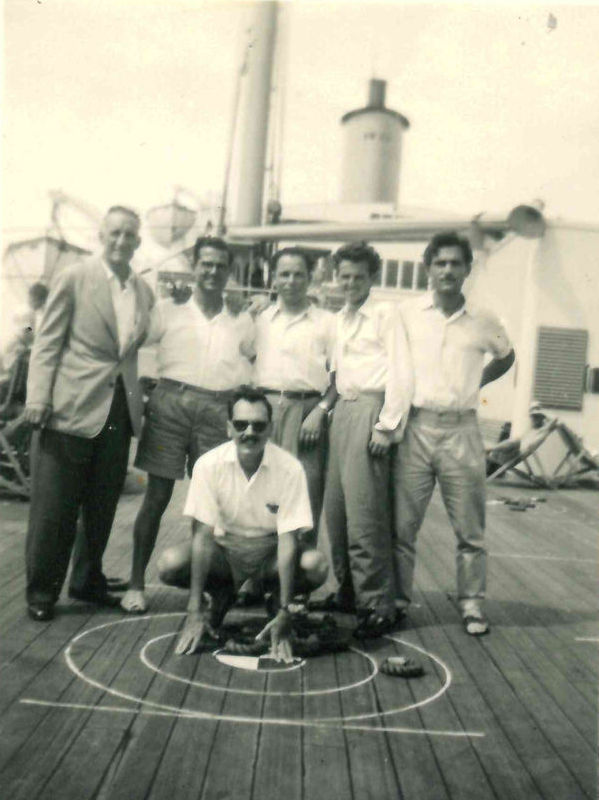
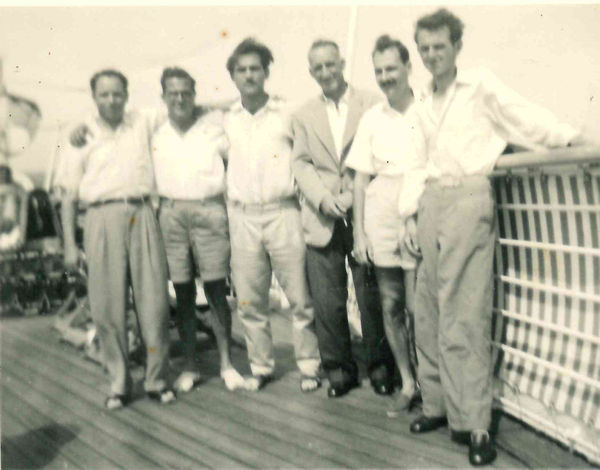
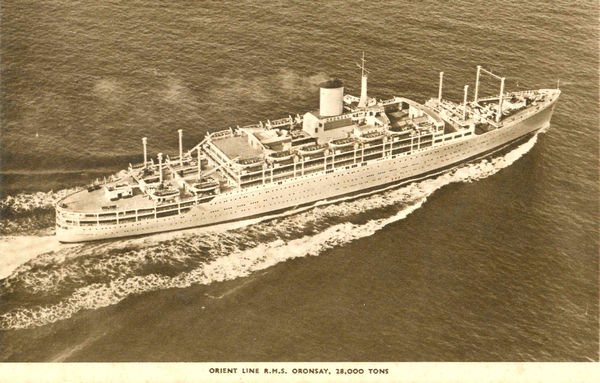
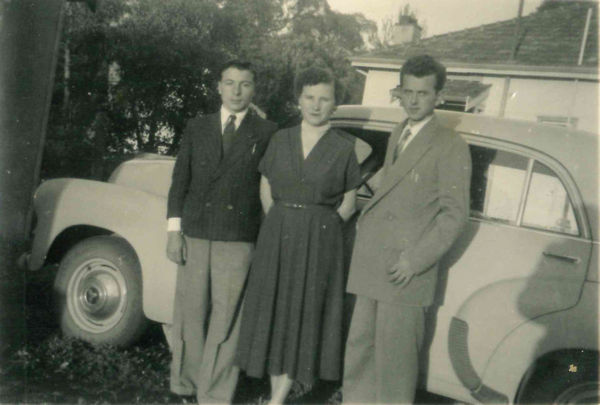
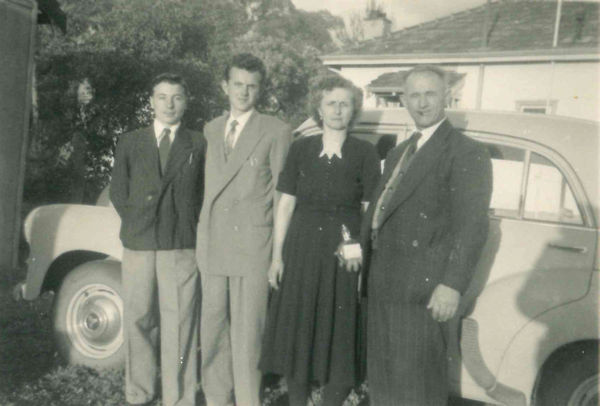 My
Teta Stoina and Tetin Risto Karamfilov drove from Manjimup to Fremantle
to greet me. Both photos were taken at my Vuijko Stojan and Vuijna
Stojanka Marin's house in Carlisle, Perth.
My
Teta Stoina and Tetin Risto Karamfilov drove from Manjimup to Fremantle
to greet me. Both photos were taken at my Vuijko Stojan and Vuijna
Stojanka Marin's house in Carlisle, Perth.



